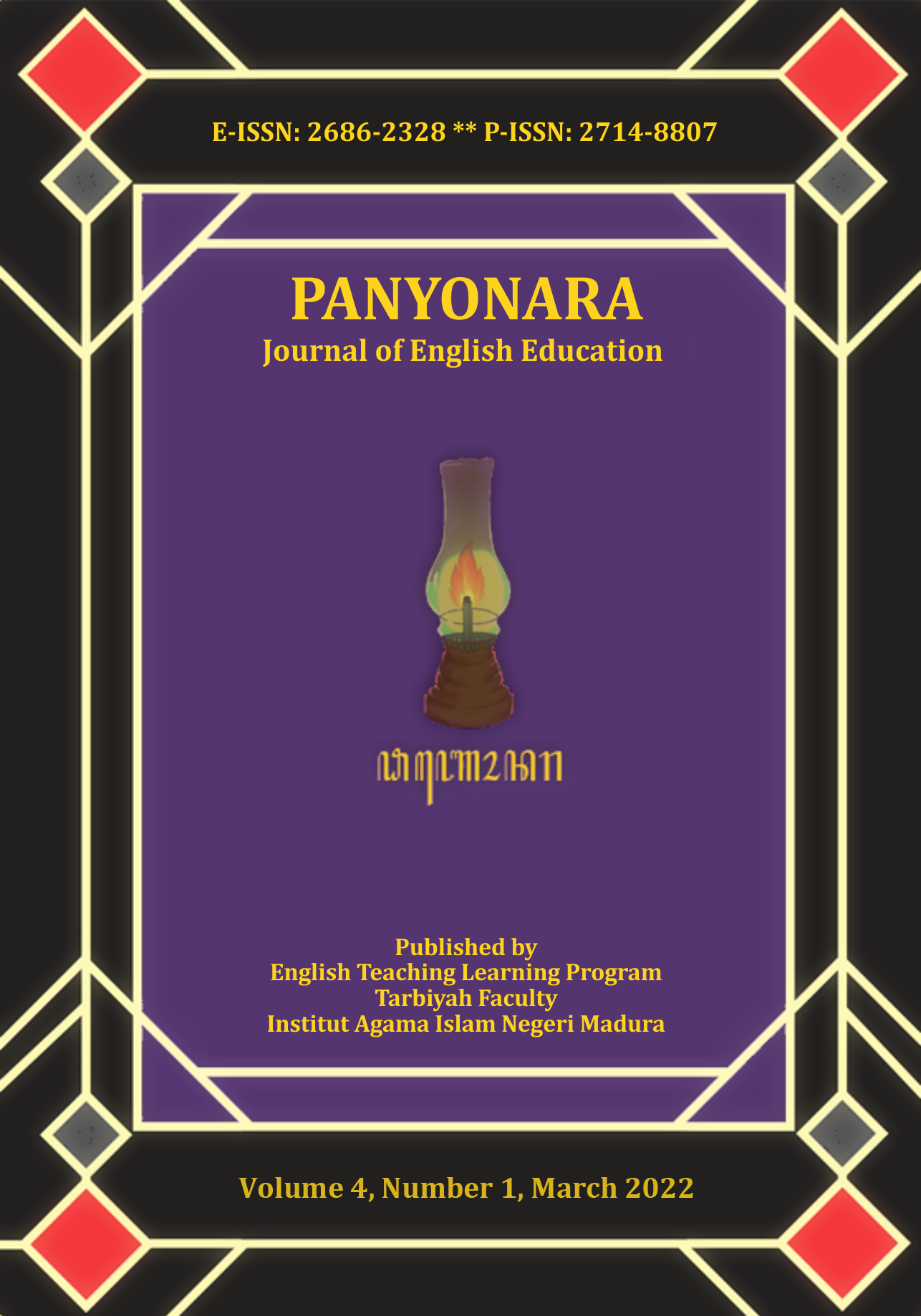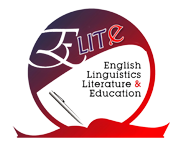Students’ Responses toward Lecturer’s Corrective Feedback on Writing 3 at English Teaching Learning Program of IAIN Madura
 Abstract views: 299
,
Abstract views: 299
,
 PDF downloads: 347
PDF downloads: 347
Keywords:
Writing, Lecturer’s corrective feedback, student’s responses
Abstract
- Writing is one of the skills in language learning requiring some abilities to be conducted. The students should pass some steps in writing. They sometimes do not know what the steps exactly are to be done first in order that they can begin writing well. The lecturer corrected the students’ writing as feedback based on the errors or mistakes made by the students. So, the corrective feedback given by the lecturer can be various. Every lecturer’s corrective feedback is expected to make the students understand what errors are made and what they should do with those errors. Here, the students’ responses can be seen. The purposes of this study are to know how the students respond to the lecturer’s corrective feedback and what styles of response shown by the students. The researcher conducted this study was qualitative descriptive research method. Interview and documentation were conducted and used by the researcher to collect the data from the lecturer and students. To check the validity of the data, the researcher used the triangulation method. The results of this research show that some students respond to the lecturer’s corrective feedback differently and the sudents’ response styles used by the students are obedient students, dependent students, and independent students.
Downloads
Download data is not yet available.
References
Azizah, Siti. Writing 3 The Process of Writing An Essay. 1st ed. Surabaya: Pena Salsabila, 2015.
Brown, H. Douglas. Teaching By Principles. 2nd ed. California: Longman, 2000.
Philip, Claire. “Positive and Negative Written Corrective Feedback: A Mixed-Method Investigation of EAP Teachers’ Word Choices.” British Council, August 2017.
Ellis, Rod. “Corrective Feedback and Teacher Development” 1, no. L2 Journal (2009).
Hanifi, Rusydi, and Puji Sri Rahayu. “STUDENTS’ RESPONSE TOWARDS THE TEACHERS’ APPROACH AND METHOD OF TEACHING,” n.d. https://dx.doi.org/10.18592/let.v4i1.1401.
Michael, Freedberg, Brian Glass, J. Vincent Filoteo, Eliot Hazeltine, and W. Todd Maddox. “Comparing the Effects of Positive and Negative Feedback in Information-Integration Category Learning.” Memory & Cognition, July 2016. https://doi.org/10.3758/s13421-016-0638-3.
Rahmawati, Risma. “STUDENTS’ RESPONSES TOWARD THE IMPLEMENTATION OF THEME-BASED TEACHING IN EYL CLASS.” Journal of English and Education 2 (2014).
Raihany, Afifah. “The Importance Of Teacher’s Written Feedback On The Students Writing In Teaching Learning Process.” OKARA: Jurnal Bahasa Dan Sastra 1 (Mei 2014).
Robert, Lado. Language Teaching (A scientific Approach). USA: by McGraw-Hill, Inc, 1964.
Rosita, Riza. “STUDENTS’ RESPONSE TOWARD MULTIMODALITY IN BOOKTRACK TO ASSIST THE STUDENTS ENGLISH LANGUAGE LEARNING AT TENTH GRADE IN SMA N 13 SURABAYA ACADEMIC YEAR 2017-2018.” UNIVERSITAS ISLAM NEGERI SUNAN AMPEL, 2018.
Solihin. “STUDENTS’ RESPONSES TOWARDS TEACHER’S HAND-WRITTEN FEEDBACK ON STUDENTS’ WRITING AT MA AL-JAUHAREN KOTA JAMBI.” THE STATE ISLAMIC UNIVERSITY SULTHAN THAHA SAIFUDDIN, 2020.
Virdyna, Nina Khayatul. “Teaching Writing Skill By Using Brainwriting Strategy.” OKARA: Jurnal Bahasa Dan Sastra 1 (Mei 2016).
Brown, H. Douglas. Teaching By Principles. 2nd ed. California: Longman, 2000.
Philip, Claire. “Positive and Negative Written Corrective Feedback: A Mixed-Method Investigation of EAP Teachers’ Word Choices.” British Council, August 2017.
Ellis, Rod. “Corrective Feedback and Teacher Development” 1, no. L2 Journal (2009).
Hanifi, Rusydi, and Puji Sri Rahayu. “STUDENTS’ RESPONSE TOWARDS THE TEACHERS’ APPROACH AND METHOD OF TEACHING,” n.d. https://dx.doi.org/10.18592/let.v4i1.1401.
Michael, Freedberg, Brian Glass, J. Vincent Filoteo, Eliot Hazeltine, and W. Todd Maddox. “Comparing the Effects of Positive and Negative Feedback in Information-Integration Category Learning.” Memory & Cognition, July 2016. https://doi.org/10.3758/s13421-016-0638-3.
Rahmawati, Risma. “STUDENTS’ RESPONSES TOWARD THE IMPLEMENTATION OF THEME-BASED TEACHING IN EYL CLASS.” Journal of English and Education 2 (2014).
Raihany, Afifah. “The Importance Of Teacher’s Written Feedback On The Students Writing In Teaching Learning Process.” OKARA: Jurnal Bahasa Dan Sastra 1 (Mei 2014).
Robert, Lado. Language Teaching (A scientific Approach). USA: by McGraw-Hill, Inc, 1964.
Rosita, Riza. “STUDENTS’ RESPONSE TOWARD MULTIMODALITY IN BOOKTRACK TO ASSIST THE STUDENTS ENGLISH LANGUAGE LEARNING AT TENTH GRADE IN SMA N 13 SURABAYA ACADEMIC YEAR 2017-2018.” UNIVERSITAS ISLAM NEGERI SUNAN AMPEL, 2018.
Solihin. “STUDENTS’ RESPONSES TOWARDS TEACHER’S HAND-WRITTEN FEEDBACK ON STUDENTS’ WRITING AT MA AL-JAUHAREN KOTA JAMBI.” THE STATE ISLAMIC UNIVERSITY SULTHAN THAHA SAIFUDDIN, 2020.
Virdyna, Nina Khayatul. “Teaching Writing Skill By Using Brainwriting Strategy.” OKARA: Jurnal Bahasa Dan Sastra 1 (Mei 2016).
Published
2022-03-31
How to Cite
Lina Suhartina Puteri, & Siti Azizah. (2022). Students’ Responses toward Lecturer’s Corrective Feedback on Writing 3 at English Teaching Learning Program of IAIN Madura. PANYONARA: Journal of English Education, 4(1), 65-78. https://doi.org/10.19105/panyonara.v4i1.5939
Section
Articles
The journal uses an Open Access policy under a Creative Commons Attribution-NonCommercial 4.0 International License. Authors who publish with this journal agree to the following terms:
- Authors retain copyright and grant the journal right of first publication with the work simultaneously licensed under a Creative Commons Attribution License that allows others to share the work with an acknowledgment of the work's authorship and initial publication in this journal.
- Authors are able to enter into separate, additional contractual arrangements for the non-exclusive distribution of the journal's published version of the work (e.g., post it to an institutional repository or publish it in a book), with an acknowledgment of its initial publication in this journal.
- Authors are permitted and encouraged to post their work online (e.g., in institutional repositories or on their website) prior to and during the submission process, as it can lead to productive exchanges, as well as earlier and greater citation of published work.
















